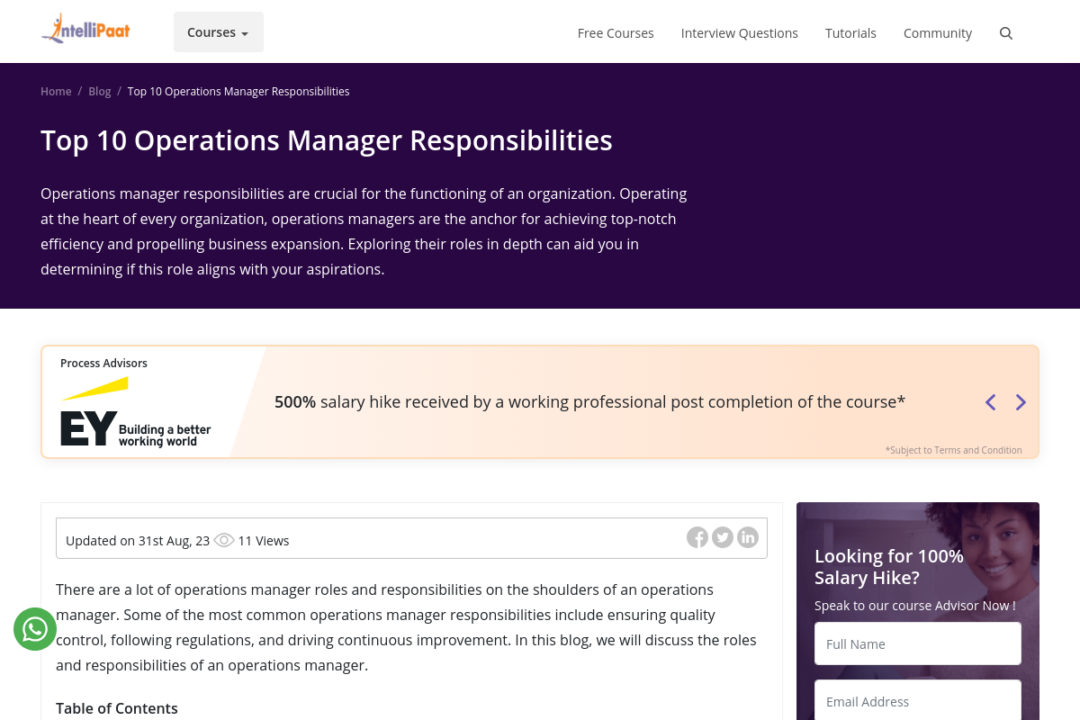Top 10 Operations Manager Responsibilities
There are a lot of operations manager roles and responsibilities on the shoulders of an operations manager. Some of the most common operations manager responsibilities include ensuring quality control, following regulations, and driving continuous improvement. In this blog, we will discuss the roles and responsibilities of an operations manager.
Table of Contents
- Who is an Operations Manager?
- Roles and Responsibilities of an Operations Manager
- Skills Required to Become an Operations Manager
- Job Opportunities in Operations
- Conclusion
- FAQs
To enhance your understanding of the topic, check out our video on Management!
{
“@context”: “https://schema.org”,
“@type”: “VideoObject”,
“name”: “What Is International Business Management | International Business for MBA | Intellipaat”,
“description”: “Top 10 Operations Manager Responsibilities”,
“thumbnailUrl”: “https://img.youtube.com/vi/HFWX_6ohd-U/hqdefault.jpg”,
“uploadDate”: “2023-08-31T08:00:00+08:00”,
“publisher”: {
“@type”: “Organization”,
“name”: “Intellipaat Software Solutions Pvt Ltd”,
“logo”: {
“@type”: “ImageObject”,
“url”: “https://intellipaat.com/blog/wp-content/themes/intellipaat-blog-new/images/logo.png”,
“width”: 124,
“height”: 43
}
},
“embedUrl”: “https://www.youtube.com/embed/HFWX_6ohd-U”
}
Who is an Operations Manager?
An Operations Manager is a leader within an organization. He handles and optimizes operational aspects within a company. The operations manager duties revolve around operational domains that contribute to the company’s success.
An Operations Manager ensures all aspects of a company are functioning. They seek ways to make processes run more smoothly. They utilize resources and money to identify problems as soon as they arise. They work with different teams to keep everything organized and efficient. while planning for changes that might happen and expansion opportunities in the future.
An Operations Manager’s primary responsibilities involve overseeing daily activities. They lead teams and ensure that operational processes align with company goals. and objectives. The Operations Manager job description is quite broad. We will discuss it in detail ahead.
Roles and Responsibilities of an Operations Manager
The role of an Operations Manager encompasses several sets of responsibilities. These operations manager roles should be fulfilled for the successful functioning of an organization.
Roles of an Operations Manager
There are diverse operations manager roles, some of which are listed below:
- Process Optimization: Operations managers use process optimization techniques to enhance productivity. They identify bottlenecks and implement process improvements. Their aim is to design efficient systems to promote smooth operations.
- Performance Tracking: Operational managers recognize the significance of KPIs. So, they track productivity, quality, and efficiency to identify opportunities for growth.
- Team Leadership: Team leaders work to foster a collaborative work environment. It is achieved by delegating tasks, setting performance targets, and offering guidance.
- Budget Management: Operations managers establish and administer budgets to control costs. They allocate funds among different departments, guaranteeing financial sustainability.
- Quality Control: Operations managers maintain high standards for product or service quality. They implement quality control measures to ensure products meet or exceed customer expectations.
- Supply Chain Coordination: These professionals supervise the supply chain. They oversee inventory levels, procurement, and distribution to prevent overstock situations.
- Crisis Management: Operations managers understand their responsibility when faced with challenges. Their role is to minimize disruptions in case something unexpected comes up.
Take the next step in advancing your career with our comprehensive General Management Course!
Responsibilities of an Operations Manager
Operations Managers are responsible for overseeing a wide range of activities. These activities contribute to the smooth operation of the business. Here is a detailed exploration of the responsibilities an Operations Manager handles:
- Strategic Planning: Operations managers develop strategies. These strategies should be in line with the organizational goals. They play an integral part in long-term planning. They take into account factors like market trends, resource allocation, and business expansion.
- Resource Management: These specialists oversee the efficient allocation of finances and equipment. It is a part of resource management practices. It maximizes output while minimizing waste.
- Vendor Management: Operations managers are responsible for collaboration. The collaboration can take place with- vendors and suppliers. They are also responsible for negotiating contracts and developing strong relationships. It ensures timely and quality deliveries.
- Capacity Planning: They anticipate future operational needs and create plans. This helps them scale resources as their business expands or contracts.
- Project Management: Operation manager duties involve overseeing various operational projects. It is done by setting timelines and allocating resources. One more thing to keep in mind is the project’s scope and budget.
- Health and Safety: An operation manager is responsible for ensuring a safe environment. They follow health and safety protocols and encourage compliance with regulations and guidelines.
- Performance Reviews: They conduct regular performance evaluations for team members. They provide constructive feedback and identify areas for skill development.
- Customer Relationship Management: Operation manager responsibilities involve working closely with customer service teams. They address customer inquiries, feedback, and complaints while striving to create customer satisfaction.
- Data Analysis: They analyze operational data to detect trends and areas for improvement. This process is done before applying insights to optimize processes.
- Compliance: The manager ensures that all operations adhere to relevant laws and regulations.
- Cross-Departmental Collaboration: Operations managers need to communicate between various departments. They work closely with sales, marketing, and finance teams.
Skills Required to Become an Operations Manager
Becoming a successful operations manager requires a diverse skill set. We have listed the top operations manager skills.
Leadership Skills: Operations managers require strong leadership abilities. They need to lead and motivate teams effectively. They should be trustworthy and create a supportive work culture. This practice encourages collaboration and productivity.
Communication Skills: Effective communication is of utmost importance in operations management. Here, expectations, shared goals, and smooth information flow among different teams are significant. Therefore, everyone must communicate effectively.
Problem-Solving: Operations managers face many obstacles in managing operations. They should have the ability to analyze problems, isolate their root causes, and then implement efficient solutions to ensure the smooth running of business operations.
Strategic Thinking: Operations managers must have a strategic mindset. They analyze data, recognize trends, and make informed decisions.
Time Management: Efficient time management ensures tasks are completed promptly. They also make sure that deadlines are met and priorities are balanced.
Financial Acumen: Operations managers often supervise budget management and cost estimation. One must have knowledge of financial reports, cost-benefit and resource allocation.
Team Building: Team formation is one of the operations manager tasks. It is of critical importance in operations management. Managers must encourage teamwork, assign roles effectively, and provide guidance and support. They should also boost employee morale and productivity.
Conflict Resolution: Workplace disputes can arise anywhere. The operations manager’s responsibility is to mediate disputes. They need to address disagreements and maintain a good environment.
Adaptability: Operations managers must adapt quickly to new technologies and trends. Adaptability is necessary for organizations to remain agile and responsive in their operations management practices.
Analytical Skills: Operations manager skills rely on data to assess performance. They then identify areas for improvement and make informed decisions. Analytical skills help in diagnosing issues quickly while also creating data-driven solutions.
Get ready to ace your next interview with the help of Project Management Interview Questions!
Job Opportunities in Operations
Operations jobs span various functions, like enhancing workflows, resource management, and optimizing processes. These roles need analytical prowess, leadership, communication, and adaptability. Operation managers work with diverse teams, fostering business achievements. The Operations Manager salary is quite high as well. Let’s delve into the diverse operations management roles:
Operations Managers: Operations Managers are responsible for overseeing daily operations. They also supervise teams and optimize processes to increase productivity and efficiency. They develop strategies, manage budgets, and drive continuous improvement.
Supply Chain Manager: They are responsible for overseeing end-to-end supply chain management. Starting from procurement and inventory to a seamless flow of goods. They make sure everything is done with reduced costs and timely deliveries.
Production Supervisor: They oversee manufacturing processes to ensure the production of goods. They also check for quality standards. They also manage schedules, allocate resources, and oversee workflow.
Operations Analyst: Operations Analyst makes sure that operational data is carefully examined. They also detect trends, inefficiencies, and areas for improvement. They offer insight to optimize processes and enhance decision-making capabilities.
Quality Control Manager: Quality Control manager ensures that products meet quality standards. They implement quality control processes, conduct inspections, and resolve quality-related issues.
Process Improvement Specialist: They acknowledge bottlenecks and inefficiencies within processes. They are also responsible for devising strategies. It helps to optimize workflows and implement changes that can increase efficiency.
Project Manager: Project management plays an essential role in operations management. They oversee projects to install new processes, systems, or initiatives. They make sure it is done on time and within budget.
Facilities Managers: They are accountable for overseeing management, infrastructure, and maintenance. Their primary responsibility is to create a functional and good working environment.
Risk Manager: They are responsible for identifying and mitigating operational risks. They can threaten an organization’s performance, reputation, or compliance by risk management.
Operations Consultants: These professionals provide expert advice to businesses. They help companies enhance operations, optimize processes, and increase efficiency.
E-commerce Operations Specialist: E-commerce operations specialists oversee online retail operations. They do order processing, inventory control, and customer service for e-commerce businesses.
Conclusion
To sum up, the role of an operations manager is important for the success of any organization. We have discussed the top 10 operations manager responsibilities, such as resource allocation, process optimization, and team management. Operations managers continue to drive excellence, and their impact can be seen across departments. Operations managers can become the driving force behind the company’s success. In a way, they’re the go-to people for various issues or concerns.
If you have any questions to ask, feel free to drop them on our Community Page!
FAQS
What are the primary operations manager’s responsibilities?
The operations manager’s responsibilities include overseeing various aspects of business operations. It includes resource management, process optimization, team supervision, and strategic planning.
How do operations managers handle resource allocation?
Operations manager’s responsibilities include allocating resources such as manpower, materials, and equipment.
What is the significance of Quality Control in operations management?
Quality control ensures products or services meet established standards. The operations manager’s responsibilities include implementing quality checks. They also rectify issues to maintain high-quality output.
Can you elaborate on financial management as a responsibility?
The operations manager’s responsibilities include management accounting and monitoring expenses. They also make cost-effective decisions to achieve financial goals while maintaining operational efficiency.
What role does innovation play in an operations manager’s responsibilities?
Innovation is vital. The operations manager’s responsibilities are to identify opportunities. The responsibilities include process enhancement and exploring creative solutions to drive continuous improvement.
The post Top 10 Operations Manager Responsibilities appeared first on Intellipaat Blog.
Blog: Intellipaat - Blog
Leave a Comment
You must be logged in to post a comment.








